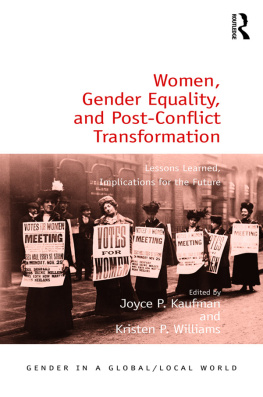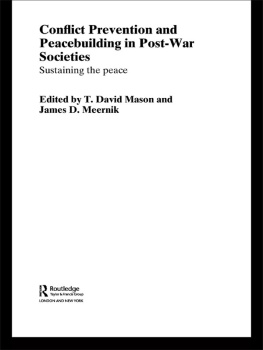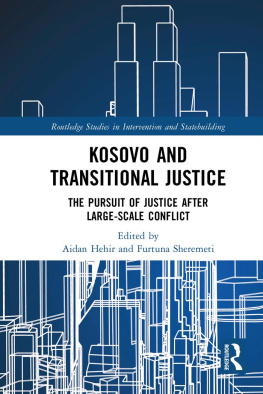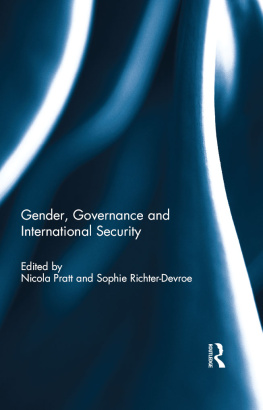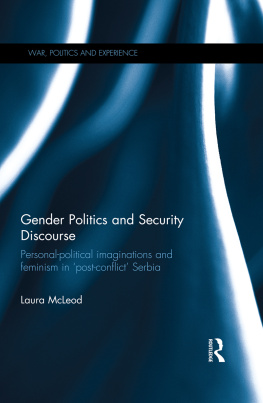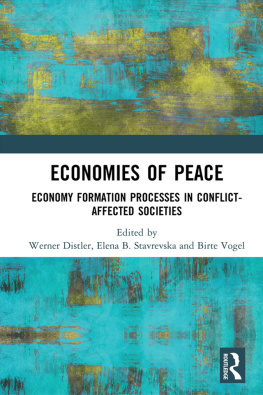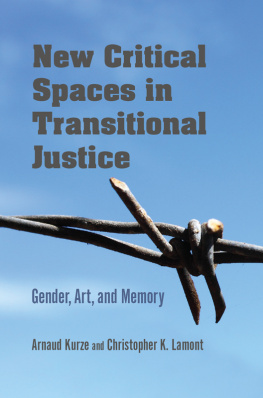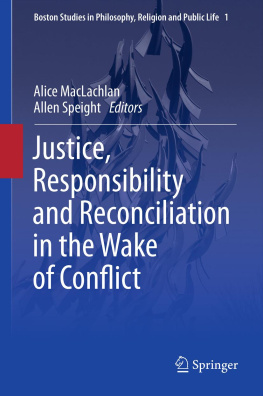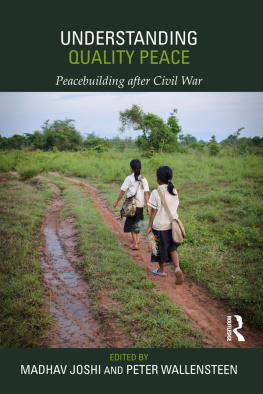Women, Gender Equality, and Post-Conflict Transformation
Kaufman and Williams have given us a richly contextualized gender analysis of post-war patriarchys stubborn sustainability. They and their knowledgeable contributors have also revealed what women, when organized and powered by feminist analytical curiosity, can do to expose that unjust and wasteful faux peace. This is a wonderfully valuable book.
Cynthia Enloe, author of Globalization and Militarism (updated 2nd edition, 2016)
This valuable collaborative study explains why in the last fifteen years, enthusiasm over the United Nations Security Council resolution on women, peace, and security has turned to disappointment. It marks important advances in theory, integrates original empirical material, and proposes key policy initiatives.
Matthew Evangelista, author of Gender, Nationalism, and War: Conflict on the Movie Screen
The end of formal hostilities in any given conflict provides an opportunity to transform society in order to secure a stable peace. This book builds on the existing feminist international relations literature as well as lessons of past cases that reinforce the importance of including women in the post-conflict transition process, and are important to our general understanding of gender relations in the conflict and post-conflict periods. Post-conflict transformation processes, including disarmament, demobilization and reintegration (DDR) programs, transitional justice mechanisms, reconciliation measures, and legal and political reforms, which emerge after the formal hostilities end demonstrate that war and peace impact, and are impacted by, women and men differently. By drawing on a strong theoretical framework and a number of cases, this volume provides important insight into questions pertaining to the end of conflict and the challenges inherent in the post-conflict transition period that are relevant to students and practitioners alike.
Joyce P. Kaufman, Whittier College, USA
Kristen P. Williams, Clark University, USA
Gender in a Global/Local World
Series Editors: Jane Parpart, Pauline Gardiner Barber, and Marianne Marchand
Gender in a Global/Local World critically explores the uneven and often contradictory ways in which global processes and local identities come together. Much has been and is being written about globalization and responses to it but rarely from a critical, historical, gendered perspective. Yet these processes are profoundly gendered albeit in different ways in particular contexts and times. The changes in social, cultural, economic, and political institutions and practices alter the conditions under which women and men make and remake their lives. New spaces have been created economic, political, social and previously silent voices are being heard. North-South dichotomies are being undermined as increasing numbers of people and communities are exposed to international processes through migration, travel, and communication, even as marginalization and poverty intensify for many in all parts of the world. The series features monographs and collections which explore the tensions in a global/local world and includes contributions from all disciplines in recognition that no single approach can capture these complex processes.
Most recent titles
Gender, Violence and Politics in the Democratic Republic of Congo
Jane Freedman
Sex, Slavery and the Trafficked Woman: Myths and Misconceptions about Trafficking and Its Victims
Ramona Vijeyarasa
Mobilizing Transnational Gender Politics in Post-Genocide Rwanda
Rirhandu Mageza-Barthel
Women, Gender, Remittances and Development in the Global South
Edited by Ton van Naerssen, Lothar Smith, Tine Davids and Marianne H. Marchand
Women, Gender Equality, and Post-Conflict Transformation
Lessons Learned, Implications for the Future
Edited by Joyce P. Kaufman and
Kristen P. Williams
First published 2017
by Routledge
2 Park Square, Milton Park, Abingdon, Oxon OX14 4RN
and by Routledge
711 Third Avenue, New York, NY 10017
Routledge is an imprint of the Taylor & Francis Group, an informa business
2017 selection and editorial material, Joyce P. Kaufman and Kristen P. Williams; individual chapters, the contributors
The right of the editors to be identified as the authors of the editorial material, and of the authors for their individual chapters, has been asserted in accordance with sections 77 and 78 of the Copyright, Designs and Patents Act 1988.
All rights reserved. No part of this book may be reprinted or reproduced or utilised in any form or by any electronic, mechanical, or other means, now known or hereafter invented, including photocopying and recording, or in any information storage or retrieval system, without permission in writing from the publishers.
Trademark notice: Product or corporate names may be trademarks or registered trademarks, and are used only for identification and explanation without intent to infringe.
British Library Cataloguing in Publication Data
A catalogue record for this book is available from the British Library
Library of Congress Cataloging-in-Publication Data
A catalog record for this book has been requested
ISBN: 978-1-4724-6895-6 (hbk)
ISBN: 978-1-315-54687-2 (ebk)
Typeset in Times New Roman
by Apex CoVantage, LLC
Contents
J. ANN TICKNER
JOYCE P. KAUFMAN AND KRISTEN P. WILLIAMS
Part I
Theory and framework
LAURA SJOBERG
FIONNUALA N AOLIN
JANE L. PARPART
Part II
Case studies
FIDELMA ASHE AND CARMEL ROULSTON
KRISTEN P. WILLIAMS
HELEN S.A. BASINI
MEGAN H. MACKENZIE
JOYCE P. KAUFMAN
KARA ELLERBY
Part III
Lessons learned, implications for the future
JOYCE P. KAUFMAN AND KRISTEN P. WILLIAMS
Kaufman and Williamss edited collection, Women, Gender Equality, and Post-Conflict Transformation, is an exciting addition to the series on Gender in a Global/Local World. The collection explores the gendered nature of post-conflict transformations. Despite the UN Security Council Resolution 1325 (passed in 2000, and followed by seven more such resolutions), the authors recognize that women are still largely absent from peacemaking processes. Men have continued to dominate peace processes, and gender equality has rarely been a factor in peacemaking. The editors have brought together an impressive, international group of gender experts to explore the limits of established peacemaking processes and the possibilities for more transformative post-conflict practices. Using a gender lens, the authors critically analyze post-conflict transformation and reconstruction, theoretically and empirically.
The book is divided into three sections. The first theoretical section sets the stage for the case studies that follow. Laura Sjoberg calls for a broader approach that incorporates men and women into the analyses of post-conflict processes. Fionnuala N Aolin argues that broad, pre-existing social inequalities influence the way the DDR processes work in post-conflict periods. Jane Parpart calls for greater attention to the way peace is imagined during and after conflicts and the implications of this imagined peace on post-conflict transformations. The second section includes seven case studies in order to highlight both commonalities and differences in post-conflict transformation processes around the world. Two cases are in Europe (Northern Ireland and Bosnia), three in Africa (Liberia, Sierra Leone, and South Africa), and two in Latin America (Guatemala and El Salvador). The Northern Ireland chapter by Fidelma Ashe and Carmel Roulston concludes that despite extensive efforts by grassroots womens organizations the peace process has failed to produce adequate mechanisms for addressing gender issues. Helen Basini identifies the limits of DDR programs in Liberia for gendered transformations. Megan MacKenzie reaches similar conclusions in Sierra Leone. Kara Ellerby compares the peace processes in El Salvador and Guatemala, highlighting the dramatic difference between Guatemalas concern with women and El Salvadors failure to address gender questions. Kristen Williams explores the role of women and gender in the Bosnian conflict, including their absence in the peace process, and the implications of these practices on the post-Dayton world of new states and strained relations in the region. Joyce Kaufman brings a historical sensibility to her analysis of post-apartheid South Africa, highlighting the continued impact of gender based violence in South Africa and the challenges facing advocates trying to realize the promise of gender equality embedded in the constitution and many official policies. The editors conclusion analyzes the previous chapters and suggests new ways to move beyond a focus on UNSC 1325. They raise important issues for rethinking gendered security and peace as well as policy making. The conclusion thus raises theoretical and policy implications for policy makers and suggestions for future pathways to achieve gender justice in post-conflict transformations.

